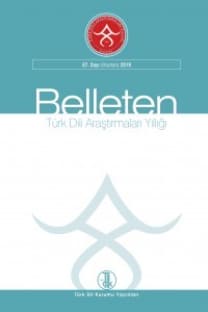Eski Uygurca Çeviri Metinleri Işığında Orhun Yazıtlarının Söz Varlığına Katkılar (I) (The Vocabulary Contributions of Orkhun Inscriptions in the Old Uyghur Translated Texts (I))
Bu makalede “idi oksuz” ve “bulun” kelimeleri incelenecektir. İlk kelimenin kökeni ve anlamı uzun yıllar çalışılmıştır ancak ikinci kelimenin kökeni konusunda neredeyse hiçbir fikre sahip değiliz. İlk olarak, Tonyukuk ve Bilge Kağan Yazıtları’nda sadece iki kez aynı durumu anlatmak için geçen “idi oksuz” kelimesinin oluşumunda yokluk belirten vurgulu yapının olduğu ve bunu doğrulayacak şekilde Çinceden eski Uygurcaya çevrilen çalışmalarda benzer kelimelerin bulunduğu açıklanacaktır. Daha sonra, “ok” kelimesinin esas anlamı - “idi oksuz” yapısının kök kelimesi –tarihsel çalışmalar, belgeler ve Türk dillerinden örnekler temelinde açıklanmaktadır. Son olarak, eski tarihsel çalışmalarla bağlantılı yorumlar esasında “idi oksuz” kelimesinin geçtiği iki yazıtta amacı ve anlamı açıklanacaktır.Bu makalede incelenen ikinci kelime ile ilgili çeşitli okumalar, ve bugüne kadar yürütülmüş çalışmalar konusunda kısa bir girişten sonra en eski tarihsel kaynaklarda, hatta dinî çalışmalarda geçtiği yerlerde kelimenin (savaş tutsağı anlamında) kaynağı araştırılarak kelimenin gerçek anlamı konusunda daha anlaşılır bir görüş geliştirme yönünde çalışma yürütülecektir
Anahtar Kelimeler:
Eski Türkçe, Eski Uygurca, Orta Çince, Çeviri, Türk İslam Edebiyatı
The Vocabulary Contributions of Orkhun Inscriptions in the Old Uyghur Translated Texts (I)
This article presents an investigation into the words “idi oqsuz” and “bulun.” While the origins and meaning of the former have been studied for many years already, we have almost no information as to the origins of the latter. To begin with, it is clarified that in the composition of the word “idi oqsuz”, which occurs only twice, in the Tonyuquq and Bilge Qaghan inscriptions when describing the same event, we have an emphatic construction indicating absence, and similar words found in works translated from Chinese into Old Uyghur are cited in support of this. Following this, the original meaning of the word “oq” - the root word of the construction “idi oqsuz” - is explained in light of historical works, documents and examples from Turkic languages. Finally the purpose and sense in which the word “idi oqsuz” was invoked in the two inscriptions is explicated with reference to accounts connected to the earliest historical works.After a brief introduction to various readings of the second word analyzed in the article, and studies conducted on it up till now, an attempt is made to give a clearer account is of the word’s actual meaning and origins by analyzing the source of the word (which means “prisoner of war”), and its traces in the earliest historical sources, and even in religious works, in which it occurs
Keywords:
Old Turkic, Old Uyghur, Middle Chinese, Translation, Turkic Islamic Literature,
- ISSN: 0564-5050
- Yayın Aralığı: 2
- Başlangıç: 1953
- Yayıncı: Türk Dil Kurumu
Sayıdaki Diğer Makaleler
Some Star Names in Modern Turkic Languages-I (Çağdaş Türk Dillerinde Bazı Yıldız Adları-I)
KARS İLİ AĞIZLARINDA EK FİİLİN OLUMSUZ ŞEKLİ “değil”İN ÖRNEKLERİ ÜZERİNE
KARS İLİ AĞIZLARINDA EK FİİLİN OLUMSUZ ŞEKLİ “değil”İN ÖRNEKLERİ ÜZERİNE
Babürname’de Geçen Askerî Terimler Üzerine (On Military Terms in Baburnama)
